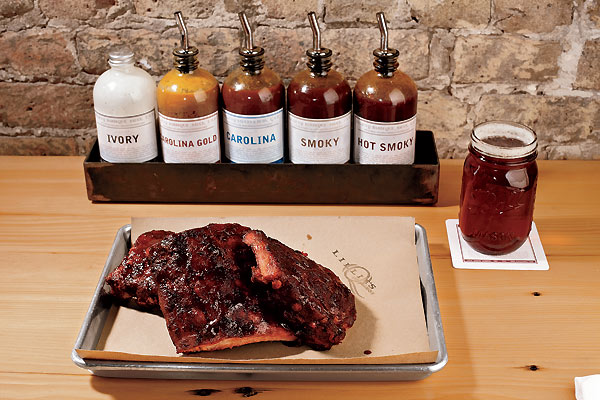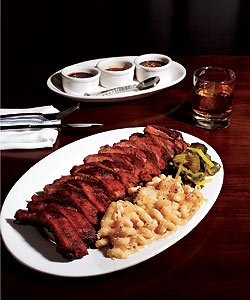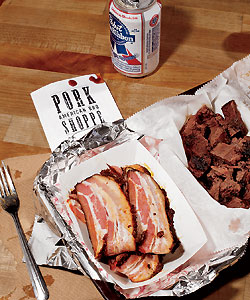
Lillie’s Q: Baby backs, homemade sauces, and Lillie’s Q Brew
What makes Memphis, Kansas City, the entire state of Texas, and certain parts of the Carolinas barbecue meccas, and Chicago a footnote? History, fanaticism, and good PR. Chicago enjoys plenty of the first two, but the third has always eluded us. If the rest of America associates any particular barbecue style with Chicago, it involves limp meat that collapses off the bone with less resistance than the French in 1940 and is doused in a tomato-based sauce so sweet they ought to give it away on Halloween. It’s safe to say our PR has been far worse than our ribs.
Then a funny thing happened. Last summer, piggybacking on the success of Smoque, Honey 1, and Uncle John’s, a fresh wave of pit masters launched restaurants within the span of months, the most promising among them Lillie’s Q, Chicago Q, and Pork Shoppe. Some dubbed the new spots “boutique barbecue,” a term both alarming and perplexing. The first word conjures up sterile images of high art and fashion, dainty and elegant; the second embodies big and messy, down and dirty, low and slow. Boutique and barbecue ought to be enemies. But there they are, chumming it up side by side, each annihilating the other’s meaning—a bona fide trendlet in this town, signifying . . . what, exactly?
Barbecue belongs in the hands of ordinary folks, where it can thrive in a smoky vacuum unfettered by fancy-pants chefs, trend sniffers, and critics like me. Charlie McKenna, the chef/owner of Lillie’s Q, may be a classically trained chef and a former kitchen soldier at Avenues and Tru, but neither distinction holds much currency in Barbecueland. So it’s reassuring to hear that he’s also a Southerner and ’cue competitor and already runs a Lillie’s Q with his parents in Destin, Florida. “My heart and passion were always in down-home country cooking,” he says. “I like to use those philosophies I learned [classical French technique] to bring Southern cooking to the next level.”
Rather than fall back on the usual cartoonish BBQ-shack porcine art, McKenna, 34, built his immensely popular Bucktown outpost to look like an American bistro: oak floors, dangling Edison bulbs, exposed brick, knotty pine tables. When the sceneyboppers and pork geeks aren’t drinking craft beers out of Mason jars and sampling Lillie’s five homemade sauces, they’re drooling on the menu, which starts with venerable low-country snacks like deep-fried pickles and boiled peanuts. You can identify the Southerners in the house by watching who sucks the juice out of the peanuts before eating them.
But my table, four pork-obsessed Jewish men one week after Yom Kippur and hence seeking something new for which to atone, did not go to Lillie’s Q for peanuts and pickles. Baby backs were our mission, and McKenna’s, buffed with a “Carolina dirt” rub, are world class. Their beautiful crust, tender-firm meat, and mind-blowing smoke immersion all raise the question: How? The answer is two enormous D.W.’s Kountry Cookers that were custom-built to ensure the charcoal and peachwood saturate the meat intensely and evenly. Order the tri-tip and you’ll see what that means. An obscure boneless bottom sirloin cut, tri-tip is sliced into supple pink strips that straddle the line between barbecue and steak. Even the pulled chicken, BBQ’s forgotten stepchild, is impeccably tender, without devolving into what purists call meat Jell-O.
McKenna may be proudest of his pulled pork shoulder, made with top-notch Boston butts. Mine arrived tinted orange and gloriously chunky, but underseasoned. It was the only time I felt compelled to add much sauce—in this case, the addictive Carolina Gold—which took a lot of work, because no matter how vigorously you pump Lillie’s heavy sauce jars, it’s hard to extract more than a few drops. Maybe that’s the whole idea in a place all about the meat.
Sides are far from throwaways, but don’t expect a respite from the pork orgy. Both the al dente green beans and buttery stone-ground grits incorporate crisp bacon cubes, and the tremendous baked beans, which have slab bacon in the mix, go even further: They’re cooked directly beneath the pork shoulder, soaking up drippings and smoke in equal measures. I half expected a snout to turn up in the irresistible sticky meringued banana pudding with vanilla wafers.
McKenna, who has quickly vaulted to the top of Chicago’s ’cue heap, bristles at the notion that he’s slumming it by working with smokers instead of chefs. “Barbecue isn’t as simple as most people think,” he says. “You can’t just throw it on the grill and eight hours later it’s done. A lot of passion goes into it. We inject it, we rub it. We slowly watch over it. We spend time with it and caress it.” Yow. Sounds like someone’s been listening to Barry White in the kitchen.
* * *
Photograph: Anna Knott

Chicago Q’s competition baby back ribs, brûléed mac and cheese, and homemade picklesOver in the Gold Coast, I wouldn’t be surprised if Lee Ann Whippen were also whispering sweet nothings to the farm-raised Duroc pigs in Chicago Q’s Southern Pride barbecue pits. A mainstay on the competitive circuit since the midnineties and the owner of Wood Chicks BBQ in Chesapeake, Virginia, Whippen looks more like a soccer mom than a BBQ goddess. But she lives and dies for the smoke. Mostly she lives: After proving her mettle by whupping Bobby Flay on Food Network’s Throwdown! she’s holding her own with the industry’s heavyweights on TLC’s BBQ Pitmasters. Now she’s hooked up with Table Fifty-Two’s Fred Latsko to transform the old bi-level Tsunami space into a Southern-clubby salon with big mirrors, dark wood, leather couches, and a private wine room.
In the topsy-turvy barbecue world, where grunge has long equaled credibility, polished details like a $12 valet are more than suspect; they’re practically immoral. But maybe the prime-aged setup signifies how seriously pit masters are taking the art of barbecue these days. As if to prove that fact, our waiter broke the record for longest explanation of How Our Restaurant Works. (Let me make it easy for you, fella: “We serve meat cooked over fire. Order a lot.”) The only potential confusion is that the menu offers competition ribs and plain old ordinary ribs; the latter cost $9 less and make you feel like a cheapskate for ordering. “A lot of heart and soul goes into the competition ribs,” Whippen says, adding to your guilt. “There are a few more ingredients and steps involved with the smoking process.”
Whippen’s kitchen uses five kinds of wood: hickory, apple, cherry, sugar maple, and white oak. You can taste the difference between them in the barbecue flight, a combo of lithe American Kobe–style brisket, pulled pork, and pulled chicken. (Any of which you can also get on a pretzel roll or mini brioche.) Or you can dig into a full slab of terrific regular baby backs—fierce, ridiculously meaty, and infused with apple tones from the wood and the rub. Couldn’t tell you if the competition baby backs were $9 better, because the kitchen ran out of them on a recent visit. (Guess they’re all out of heart and soul by 8 p.m.) A sumptuous layer of fat adhered to Whippen’s gorgeous competition St. Louis ribs, pushing the tender, shreddy meat to a level of decadence rarely seen in Chicago ’cue. Not a $33.75 level, but close.
Chicago Q might get a lot of guff for its prices, but much of its menu is reasonable. The excellent Cheddar-jalapeño hush puppies with house-cured bacon ($6.75), tempting brûléed mac and cheese ($5.75), and desserts such as the wonderful flourless chocolate soufflé ($5.75) would be pushing double digits a block away at Table Fifty-Two. And in the end, the cognitive dissonance of eating barbecue in a bistro space amounts to nothing. Chicago Q boasts gracious, attentive service and comfortable environs, and it happens to serve barbecue. Put another way: Just because the valet is $12 doesn’t mean the ribs are going to be lousy.
* * *
Photograph: Anna Knott

Pork Shoppe’s pork belly pastrami and beef brisket Around the bend from Hot Doug’s and down the street from Kuma’s Corner, Pork Shoppe forms the third point of what has become the Avondale Meat Triangle. The tidy little counter-service spot does not represent a labor of love by barbecue lifers but rather a smart venture from veteran restaurateurs (Tizi Melloul’s Steven Ford, Michael Schimmel, and Jason Heiman) who were among the first to see which way the wind was blowing. The trio embraces the boutique-barbecue tag; instead of using BBQ buzzwords like “passion,” they talk about research. “Pork is the new sushi,” Ford said when the restaurant opened last April, a statement that may be an insult to both pork and sushi.
If it’s a calculated operation, the gentlemen calculated well. Pork Shoppe’s only real décor, other than some antique mirrors, consists of ominous farming implements, such as a pitchfork, a sickle, and a hacksaw, hung on the walls. The room looks like Leatherface’s toolshed. And Pork Shoppe, like its obvious progenitors over at Smoque, proves that you don’t need to have been born in a smokehouse to produce good barbecue. Our first hint of that was the free basket of gloriously silky Slagel Farms pork belly pastrami, which Schimmel told us had been aged for ten days and smoked for 12 hours with hickory, oak, and applewood in a Toastmaster. Wonderful. If only the supple, pink-toned pulled pork shoulder had been half as smoky.
Schimmel, a gregarious bear of a man, tells my crew that bigger, fattier St. Louis ribs are for men and leaner baby backs are for women. (He also mentions that his mother used the sickle to cut weeds on her family’s farm outside Forreston.) We do prefer the St. Louis slab, a moist cut that needs nothing beyond its cinnamon-tinged dry rub and gentle mopping of sugary sauce. The baby backs look fantastic but are dried out and lack that desired smolder—a problem because you find yourself reaching for one of Pork Shoppe’s three sauces, and they’re the weakest link of the venture. The only keeper is Wicked Spicy, a tongue spank that tastes like it had a layover in Ciudad Juárez on the way to Memphis. The real star is Pork Shoppe’s staggering beef brisket. Rubbed for 24 hours, then smoked and chopped into chewy, delectable chunks, it sports the same kind of moist interior and crispy-edged bark as the legendary stuff at Smoque. A small, simple list of beers and bourbons shores up the experience, as do straight-up sides, particularly crisp skin-on french fries and jalapeño corn bread with creamy honey butter.
Now that Chicago is finally enjoying its moment in the smoke, one might be tempted to say that all this represents some sort of revolution in the notoriously rigid world of barbecue. But if we’ve learned anything from the ’cue onslaught of 2010, it’s that you don’t have to be a grizzled old coot to make long-smoked meats, nor do you need to do it in a ramshackle plywood roadhouse to be taken seriously. Why can’t barbecue be upscale? Because you eat it with your fingers? So pick up the fork.
THE SKINNY
LILLIE’S Q
1856 W. North Ave.; 773-772-5500
FYI Charlie McKenna’s pulled pork won the Memphis in May barbecue competition in 2007. TAB $20 to $25 HOURS Lunch, dinner daily. Tab does not include alcohol, tax, or tip.
CHICAGO Q
1160 N. Dearborn St.; 312-642-1160
FYI You can buy a whole pork shoulder with Kobe beans, corn bread, and coleslaw for $305.TAB $30 to $40 HOURS Lunch, dinner daily. Tab does not include alcohol, tax, or tip.
PORK SHOPPE
2755 W. Belmont Ave.; 773-961-7654
FYI That wooden seat near the east wall is an old church pew. TAB $10 to $15 HOURS Lunch, dinner Tuesday through Sunday. Tab does not include alcohol, tax, or tip.
Photograph: Anna Knott


